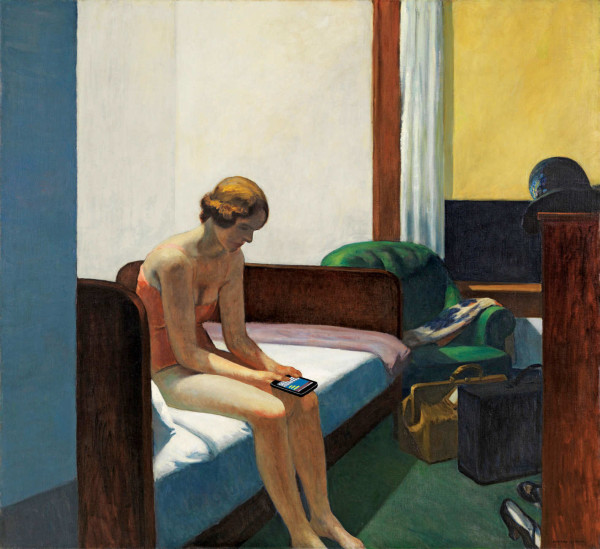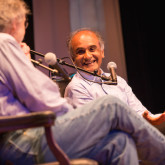
Edward Hopper‚Äôs ‚ÄėHotel Room,‚Äô 1931, with an updated meditation on solitude in the 21st century.
If you really, really want to know how I feel, this is an excerpt from On the 2016 presidential election, a personal history and sociological rumination.
‚ÄúIt‚Äôs okay, fine, even mandatory to take a political position and not care if you gain or lose readership.‚ÄĚ ~ Rachel Kushner at Key West Literary Seminar, January 13, 2017
When Donald Trump announced his presidential candidacy in June 2015, I had one reaction: This makes me wanna barf.
I may have even tweeted it as a reaction to the Page Six story that appeared on my timeline. Yes, I am a Millennial (albeit the eldest cap of that generation) who gets all of her news and information from her carefully curated Twitter feed.
I was done with Trump as far back as 2011 when he became an outspoken voice of the birther movement falsely accusing our first black president of not being born in the United States and therefore insinuating that he was ineligible to hold office. Not only was it a cruel lie, it was outright racist. Full Stop. Period. End of Story.
I’ve tuned out Trump ever since, turning off the television anytime his face appeared. I had absolutely no room for someone who I considered an arrogant and unapologetic blowhard and bigot. I have found nothing funny, entertaining or compelling about him since.
My small protest throughout the primaries was to continue to drown out Trump to the best of my abilities. I abstained from publishing his name on social media or elsewhere, feeling that any attention given to him was too much. More to the point, I thought it was dangerous and ill advised.
Still, no matter how hard I tried, his voice seeped in through every crack and crevice like a noxious fume. The media, entertainment industry and American public collectively salivated over Trump with wide, lascivious eyes, savoring his name as it tripped across their tongues.
I became increasingly flabbergasted by the tepid rebuffs and conciliatory reporting of Donald Trump, so much of it applied with star-struck awe or horror. Comedians and late night talk show hosts guffawed at their dumb luck, lauding him ‚Äúgood for comedy.‚ÄĚ Liberals had a field day on social media, expressing their outrage and dismay through a competition of clever punch lines and memes. The culture industry at large held Trump in a warm embrace.
The ‚Äúculture industry‚ÄĚ is a term coined in 1944 by a group of Jewish German sociologists and philosophers from the Frankfurt School, known as critical theorists. Two of its leading thinkers, Theodor Adorno and Max Horkheimer, penned¬†Dialectics of Enlightenment¬†during their exile in the United States from Nazi Germany, where they argue that the culture industry is a tool of mass deception masquerading as enlightenment, composed of film, television, radio, magazines, popular music and, therefore, all art. Today, this would most certainly include the Internet and social media.
‚ÄúThe whole world is passed through the filter of the culture industry,‚ÄĚ Adorno and Horkheimer write. From the Frankfurt School‚Äôs point of view, the culture industry was a tool to subdue the public during their leisure hours after the economic forces of capitalism subdued them in their working hours. The result being the submission to ‚Äúthe total power of capital.‚ÄĚ
For the culture industry‚Äôs part, this became possible when high art transformed into mass produced popular entertainment through standardization and the mechanics of industry. Disseminated to the public rapidly through new technology, the culture industry was ‚Äúdemocratically [making] everyone equally into listeners.‚ÄĚ The effect, Adorno and Horkheimer conclude, is that ‚Äúculture today is infecting everything with sameness.‚ÄĚ
In the 1940s, they were criticizing the tyranny of technology as it shifted from the telephone to radio programs and from silent films to talkies. (‚ÄúThe basis on which technology is gaining power over society is the power of those whose economic position in society is strongest.‚ÄĚ)
Even then, the critical theorists were seen as cranky and antiquarian (Adorno famously loathed jazz music). To abide by their theory is to surrender pleasure in almost any amusement.
However, as we forge ahead through the new millennium, with western democracy and capitalism in a state of crisis, the culture industry, with the added velocity of social media and the 24-hour news cycle, has reached a new crucible. I can’t help but think that critical theory is especially prescient in the world we live in today.
What I observed throughout the election was that whether it was a news brief on NPR, a pundit analyzing the election on NBC, the punch line of a joke on a late night talk show, the cold open on SNL, the headline of a New York Times or CNN .com article, what my friends were railing about on Facebook and what the Twittersphere was hyperventilating over on Twitter, everyone was talking about the same thing.
As a populace, we were ground into submission by this constant barrage. While it may appear that we have more choice than ever before from which we get our news, the culture industry‚Äôs swindle is in presenting us with ‚Äúthe freedom to choose what is always the same.‚ÄĚ
At the advent of the Internet’s primacy and social media, the publishing industry predicted that their future was in the decentralization of media and the move towards niche products. This may have happened. There are more websites, blogs, media outlets, voices, avatars and pundits in the public cultural sphere than ever before.
Each one of us has the ability to add our voice to the conversation through multiple channels. However, what may have begun as a radical, unregulated cacophony of diverse voices and platforms has become a rigid structure. This happened precisely as the industries figured out how to monetize this new medium and they continue to do so with ever-growing sophistication.
What we consume and create on the Internet is filtered through the elusive algorithms of a handful of powerful Silicon Valley companies: Facebook, Google, Apple, Amazon, Twitter. They are the economic forces of the culture industry in the new millennium and they make their profit by exploiting their users through the illusion of control and choice when, in fact, the choice is being made for them. In order to be heard, we have to play by their rules.
From publications to for-profit companies to personal brands, there’s competition for clicks, likes and capital, forcing all of these competing outlets to winnow down their strategy into what gets the most traffic. This is how sameness bleeds through everything we’re exposed to. It’s the standardization and mass production that the critical theorists warned of.
There is something to be said of the information silos created by the left and right during the election. I’d personally never heard of Breitbart News before Trump’s win and I still can’t name any of the major right-wing publications off the top of my head. I don’t watch cable news. My media consumption consists of The New York Times, The New Yorker, New York Magazine, The Washington Post, NPR and, on occasion, NBC News.
Still, this optic of choice is an illusion. As Adorno and Horkheimer explain, these preferences ‚Äúdo not so much reflect real differences as assist in the classification, organization and identification of consumers. Something is provided for everyone so that no one can escape‚Ķ Even the aesthetic manifestations of political opposites proclaim the same inflexible rhythm.‚ÄĚ
Social media is often lauded for its ability to democratize voices. If Adorno and Horkheimer were concerned about radio and movies as authoritarian tools of submission, then surely the participatory nature of social media is a positive progression. There are plenty of instances of these platforms giving voice to social movements, from the Arab Spring to Occupy Wall Street to Black Lives Matter.
That‚Äôs precisely the potential the critical theorists saw in latter day forms of art and expression. Their criticism of technology was not ‚Äúattributed to the internal laws of technology itself but to its function within the economy today.‚ÄĚ
In the new millennium, the culture industry has been constructed so that opting out is not an option. Technology today holds the false promise of freeing us from the bondages of worker and consumer through mobility and entrepreneurship. In reality, it’s only tightening the vice grip on our dependence of and allegiance to its sovereignty. It’s the stranglehold of a choke collar that, once clamped down, will not give way, but can only be tightened.
So much of how we absorbed and digested the election has been filtered through the Internet and social media because that is how we absorb and digest most things these days. I’ve long been suspicious that we’ve all gravely fooled ourselves as a society into thinking that social media is a positive tool for connection and communication.
We all use it. We all know its benefits. Let’s get those out of the way up front. It’s a tool for self-promotion, staying in touch with friends and acquaintances, and sharing and acquiring information. It’s also a fun diversion.
More than anything, though, it‚Äôs a mirror. We look into our phones and we‚Äôre looking for ourselves. Not other people‚Ää‚ÄĒ‚Ääbut how other people react to something we‚Äôve posted. It‚Äôs become such a deeply embedded extension of narcissism, a trait we clearly can‚Äôt escape as human beings, that we‚Äôve all bought into the idea that it is an appropriate manner to view the world and communicate.
This election was exhaustively described as divisive. That‚Äôs because everyone is talking and no one is listening. When was the last time you read a political opinion that you disagreed with on Facebook and by doing so, it made you change your mind? When have you ever had a productive debate in the comments section? What catharsis have you achieved by venting your private frustrations in a public forum for all to scrutinize without your knowledge? What urge are you addressing by prefacing your statements with ‚ÄúI don‚Äôt usually post things like this, but‚Ķ?‚ÄĚ
We are starved for connection and empathy, but we are not getting it from social media. Instead, we sanctimoniously unfollow, unfriend, block, mute, or worse, I suppose, troll or lament being trolled. But we are not communicating.
It’s one thing to post a snarky comment or spew something hateful directed towards a social media avatar in a comment thread on your computer screen, but it’s far different to look someone in the eyes, another human being, made of soft flesh with blood coursing through his veins, fallible and vulnerable, and actually listen and engage in civil discourse. So much venom is removed in doing so, yet somehow, we’ve stopped doing this as Americans. The result is dehumanizing, racking us with fear, cowardice, paranoia and isolation on all fronts.
This inability to communicate nullifies the effort poured into social media. The effect of everyone talking without listening is the equivalent of everyone listening to their own version of the truth propagated by the culture industry’s algorithms. We’re still listeners and consumers, but in the new millennium, it’s under the insidious guise of self-expression and communication. We’re producing little more than white noise and wasting an awful lot of time and energy.
‚ÄúDistraction becomes exertion,‚ÄĚ Adorno and Horkheimer warn.
The American public, propelled by the culture industry, gracefully dove into the swirling cesspool of election discourse. We’ve become a nation of pundits, with a loose grasp on facts and an aversion to critical thought, baited just as easily as the president-elect, fed by a constantly churning cycle of outrage. We feel an overwhelming urge to participate in this immolation through whatever means of publication we possess, making our fickle knee jerk reactions known to the world with the potential of infinite reverberation
This ecosystem has created fertile ground for the frighteningly rapid proliferation of so-called ‚Äúfake news,‚ÄĚ but, please, let‚Äôs call it what it is: propaganda. Fake news is a little too benign. After all, that‚Äôs what we‚Äôve labeled programs like¬†The¬†Daily Show¬†and¬†SNL‚Äôs Weekend Update for decades. In that case, perhaps we had it coming.
It’s proven such a corrosive phenomenon that on Christmas Eve, a Pakistani defense minister threatened nuclear war with Israel via Twitter because of a fictional quote on a propaganda site attributed to a former Israeli defense minister. There is now concrete evidence that Russia used these tools to influence the outcome of our election, according to an intelligence brief released on January 6.
We are living in Dr. Strangelove 2.0. And we’ve appointed a commander in chief who relishes the blurred lines between true and false, fact and opinion, wrong and right.
Donald Trump has proven himself a master manipulator of the culture industry. To him, they handed over $2 billion worth of free press, more than twice that of Clinton and six times that of his closest Republican rival Ted Cruz, accounting for half of all presidential campaign coverage. One cannot deny that Trump was very, very good for the culture industry’s bottom line.
Where did this American appetite for Trump‚Äôs foibles originate? Was it justly served to us because we devoured it with deep satisfaction? Adorno and Horkheimer argue that this phenomenon is merely ‚Äúa cycle of manipulation and retroactive need‚Ķ unifying the system ever more tightly.‚ÄĚ It seems that entertainment was easier to digest than substance, fact and analysis.
In casual conversation, I’ve heard time and again that at least Trump isn’t boring like Hillary, that people can’t wait to see what he’ll do next, from SNL’s latest parody to the inauguration to his tweets, say what you will, these next four years will be entertaining! Yes, at least we will still be entertained while the world crumbles around us! we rejoice in chorus. There will still be plenty of fodder for your Facebook feed.
‚ÄúEntertainment,‚ÄĚ Adorno and Horkheimer warn, ‚Äúfosters the resignation which seeks to forget itself in entertainment.‚ÄĚ It‚Äôs the symbol of a snake eating its own tail.
Despite the post-election bloom of intelligent op-eds repudiating Trump, I get the sinking feeling that the culture industry is happy he’s still around to foment over. After all, they created him and they’ve been having a fun, wild ride at our expense this whole time. As the plot gets stranger by the day, it feels like we’re zealously absorbing the news of what’s happening to our country like a thrilling comic strip or spy novel.
With so much information at our disposal, the culture industry’s over-arching narrative of the 2016 presidential election was astoundingly uniform. As a result, we were stripped of our ability to comprehend the high stakes of our vote.
We the people of the United States of America approached the election as entertainment-starved dimwits hypnotized and manipulated by the gladiatorial spectacle of politics as reality television, while the fate of our nation hung in the balance.
And we haven’t diverted our eyes yet.
If you really, really want to know how I feel, this is an excerpt from On the 2016 presidential election, a personal history and sociological rumination.






Pingback: Tracy Mckay()